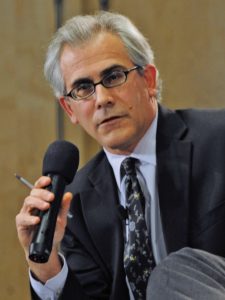The award-winning journalist, author, and MSNBC contributor David Corn pulls no punches. In a recent column, the Mother Jones Washington bureau chief writes that we are living “in a world where a narcissistic, racist, misogynistic, ignorant, loudmouth reality television celebrity can become president” and where fewer Americans are appalled by this reality than are entertained by its spectacle.

How did we get here? And what can be done to fix it? Corn, who vacations each summer on the Outer Cape, will address the first of these questions, at least, this Sunday at 7 p.m. when he speaks on “Our Nation in Crisis” at the Truro Meeting House.
Corn says, fairly enough, that “as a journalist, I don’t do a lot of calls to action.” Rather, he tries “to look at the present clearly” and to elucidate its emergence from the past. He argues that Donald Trump’s presidency, the Big Lie about its demise, and the prospect of its resurrection are all symptoms rather than sources of the present crisis. “What does it mean for a democracy,” he asks, “to live in a country in which 20 to 30 percent of the public doesn’t accept fundamental precepts of reality?”
The title of Corn’s forthcoming book doubles down on this diagnosis of mass cognitive infirmity and assigns a clear political pathogen. American Psychosis: A Historical Investigation of How the Republican Party Went Crazy is due out next month from the publisher Twelve.
Since the 1950s, the book’s advance publicity declares, the G.O.P. has “forged alliances with extremists, kooks, racists, and conspiracy-mongers, … nurtured and exploited rightwing fear and loathing fueled by paranoia, grievance, and tribalism, … [and] poison[ed] the nation’s discourse.” Trump, Corn contends, is “not an aberration but a culmination.” He took what earlier Republican presidents did “somewhat furtively” and made it “the centerpiece of the brand.”
Though they may not have been personally inclined to paranoia, grievance, and tribalism, even the most moderate of Trump’s predecessors have “made deals with the devil” in their quest to win or maintain power, says Corn. His book unveils many little-known or largely forgotten strategic alliances with “the darkest forces in America.”
Among the most striking of these is Dwight Eisenhower’s 1952 endorsement of Cold War conspiracy-monger Sen. Joseph McCarthy, who had accused sitting Secretary of Defense George C. Marshall — Eisenhower’s friend and fellow World War II hero — of spearheading a Communist takeover of the U. S. government. Forty years later, George H.W. Bush lavished praise on the fanatic Pat Robertson, who had published a book, The New World Order, that purported to expose a centuries-old global conspiracy, led by Satan, financed by Jewish bankers, and unwittingly aided by a well-placed useful idiot, President Bush himself.
Other stories about the sources of paranoia, grievance, and tribalism offer different timelines and geographies for these developments and distribute blame for them more widely. Essayist Pankaj Mishra argues in Age of Anger: A History of the Present that these are global maladies, not just American ones, caused by the failure of Enlightenment rationalism and neoliberal capitalism to deliver equality or meaning to populations whose traditional lifeworlds they destroyed.
Law professor Daniel Markovits’s The Meritocracy Trap: How America’s Foundational Myth Feeds Inequality, Dismantles the Middle Class, and Devours the Elite contends that the ideal of meritocratic advancement, embraced by both Democratic and Republican elites, has masked and facilitated “the concentration and dynastic transmission of wealth and privilege” within a geographically and educationally segregated community of professionals, leaving the country’s cultural and economic losers to stew in confusion, envy, and humiliation.
And, decades ago, legal scholar and political philosopher Mary Ann Glendon warned that a healthy democracy could not withstand the growing individualistic and inevitably polarizing discourse of nonnegotiable rights. “Unfortunately,” her 1991 book Rights Talk: The Impoverishment of Political Discourse concludes, “American political discourse has become vacuous, hard-edged, and inflexible just when it is called upon to encompass … problems of unparalleled difficulty and complexity.”
These and other accounts of our national crisis imply different approaches to the issue — endlessly debated in today’s mainstream and progressive media — of whether “we” who are reasonably appalled by Trumpism should be seeking to persuade its millions of supporters or to vanquish them.
Corn is ambivalent on this question. He views Republican voters much as Hillary Clinton did in 2016, when she remarked that half of them were irredeemable racists, sexists, and xenophobes who belonged in a “basket of deplorables,” while the other half were “people who feel that the government has let them down [whom] we have to understand and empathize with.” Of this infamous assessment, Corn says, “You can argue with her math, but conceptually she was right.”
The question of Trump voters’ persuadability, however, is perhaps mooted by a question more profound: whether the prevailing dynamics of information production and consumption in our current media ecosystem are conducive to changing minds at all.
“When I wrote for The Nation 40 years ago,” Corn says, “if anybody wanted to share something I’d written they’d have to find a copy machine, buy a stamp, and mail it.” Now, he continues, any journalist can potentially “capture the attention of millions, and that to me is incredibly exciting.” But what is the nature of that attention? Sitting down to read or watch the news used to be “a discrete, individualized experience you’d focus on,” he says. “People absorb journalism now in the same manner that they go online to shop for shoes. You may read something, you may buy something, then you see a viral video of monkeys jumping frogs that you have to send to your cousin. All these activities meld, and that’s not good for journalism.”
On Sunday at the Truro Meeting House, at least, a discrete, individualized experience of serious journalism will once again be on offer.



